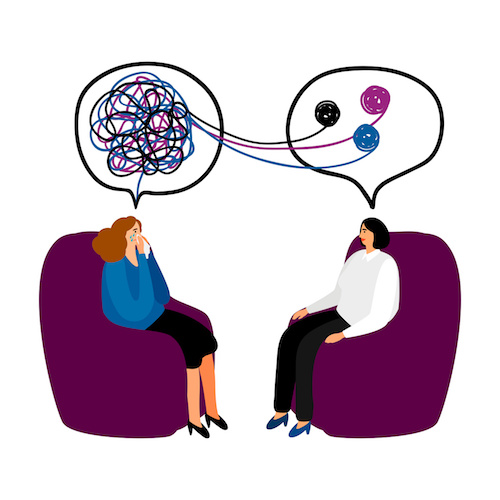The Relevance of Mental Health: a Deep Dive Into Therapy, Therapy, and Their Advantages
Psychological health and wellness substantially forms specific wellness, affecting actions, feelings, and thoughts. Counseling and treatment offer as crucial opportunities for healing and individual advancement. They supply structured support, aiding people browse life's difficulties. Yet, many continue to be unaware of the details kinds of therapy offered and their one-of-a-kind advantages. Comprehending these aspects is essential for anybody thinking about professional psychological health and wellness assistance. What adheres to may illuminate courses to resilience and gratification that many neglect.
Recognizing Mental Health And Wellness and Its Influence
Psychological health is usually overlooked, it plays an essential function in overall wellness and everyday functioning - Cognitive Behavioural Therapy. It includes psychological, mental, and social elements that influence just how individuals think, really feel, and behave. A person's psychological health directly impacts their capability to handle anxiety, connect to others, and make choices. Poor mental health can bring about different problems, consisting of anxiety, clinical depression, and difficulty in maintaining connections, all of which can impede expert and personal growth.Furthermore, mental health and wellness has far-ranging effects for physical health and wellness. Chronic stress and anxiety and untreated mental problems can add to various physical conditions, such as cardiovascular disease and compromised immune responses. Conversely, favorable psychological health and wellness promotes durability, making it possible for individuals to handle life's challenges efficiently. Understanding mental health's importance is essential for promoting supportive environments that promote psychological well-being, thus enhancing the lifestyle for neighborhoods and people alike
The Different Sorts Of Therapy and Therapy
In the domain name of psychological wellness, various therapy and therapy kinds cater to varied needs. Individual counseling methods focus on individual issues through individually sessions, while group therapy dynamics foster shared experiences and support amongst individuals. Comprehending these methods is crucial for picking the appropriate treatment for various difficulties.
Individual Therapy Techniques
Numerous individual therapy strategies exist, each created to address specific mental health and wellness concerns and satisfy differing customer demands. Cognitive Behavior Treatment (CBT) focuses on recognizing and transforming unfavorable idea patterns, while Psychodynamic Treatment discovers past experiences and subconscious processes. Humanistic Therapy stresses individual development and self-actualization, cultivating a helpful atmosphere. Social Treatment (IPT) targets partnership concerns and interaction patterns to improve psychological wellness. Additionally, Acceptance and Commitment Treatment (ACT) urges customers to accept their ideas and feelings while committing to personal values. Each technique uses one-of-a-kind methods and philosophies, enabling professionals to tailor their methods to the individual, consequently enhancing the restorative experience and promoting mental health and wellness recuperation.
Team Treatment Dynamics
Group therapy characteristics include various healing methods that take advantage of the power of interpersonal partnerships and shared experiences. This form of therapy frequently includes varied teams, promoting a risk-free environment for individuals to share thoughts and feelings. Key sorts of group treatment include support system, which provide psychological support; process-oriented groups, concentrating on interpersonal interactions; and psychoeducational groups, focused on passing on understanding concerning mental health and wellness problems. The characteristics within these teams can boost self-awareness, as members commonly assess their behaviors in connection with others. Furthermore, group therapy cultivates a sense of belonging, reducing feelings of isolation. Through shared stories and collective problem-solving, participants can develop dealing strategies and gain understandings, ultimately adding to specific development and healing.
The Function of Therapy in Mental Health And Wellness
Counseling plays an important duty in mental health and wellness by providing numerous approaches tailored to individual requirements. These approaches offer specialist support that can lead to considerable renovations in psychological wellness. Recognizing the different types of therapy can help people make educated decisions regarding their mental wellness care.

Kinds of Counseling Methods
While different counseling techniques exist, each deals distinct methodologies and insights right into mental health treatment - Cognitive Behavioural Therapy. Among one of the most popular are cognitive-behavioral therapy (CBT), which concentrates on modifying negative idea patterns; psychodynamic treatment, which discovers unconscious procedures and youth experiences; and humanistic approaches, emphasizing individual development and self-actualization. Furthermore, solution-focused quick treatment prioritizes locating options in the here and now instead of diving into issues. Group treatment promotes area and shared experiences, while family treatment addresses relational dynamics within familial structures. Each method deals with various needs, aligning with individual choices, problems, and therapeutic goals. Understanding these techniques helps customers make educated choices regarding their psychological health and wellness journey and advertises effective therapy tailored to their distinct situations
Benefits of Specialist Assistance
Many people take advantage of professional support in handling their psychological health and wellness difficulties. Counseling offers a secure space for clients to explore their thoughts and sensations without judgment. This healing environment fosters self-awareness, permitting individuals to determine patterns in their actions and create much healthier coping methods. Expert advice also offers access to evidence-based methods that can relieve symptoms of anxiety, anxiety, and various other mental health and wellness issues. Furthermore, counselors can help in setting reasonable objectives and provide assistance in achieving them, enhancing overall well-being. The joint partnership in between counselor and customer is essential, as it promotes accountability and encourages personal development. Ultimately, professional advice plays an important duty in guiding mental health journeys, leading to boosted psychological durability and life satisfaction.
Advantages of Therapy: Recovery and Development

How to Pick the Right Therapist or Counselor
Just how can one browse the usually frustrating procedure of choosing the best therapist or therapist? Recognizing individual requirements is vital; individuals ought to consider their particular issues, whether stress and anxiety, relationship, or depression obstacles. It is advantageous to study different therapeutic approaches, such as cognitive-behavioral treatment or psychodynamic therapy, to discover an appropriate match.Next, possible clients need to seek referrals from relied on sources or use online directory sites. It is vital to assess specialists' credentials, including their Cognitive Behavioural Therapy education and learning, licensing, and areas of field of expertise. Arranging initial appointments can assist gauge compatibility, enabling people to assess interaction designs and personal comfort.Finally, logistical variables, such as area, schedule, and fees, ought to additionally be considered. By attentively weighing these aspects, one can make an educated choice, eventually fostering a restorative connection that sustains psychological wellness and personal growth.
Getting Over Stigma: Welcoming Mental Health And Wellness Assistance
While social mindsets towards psychological health have actually evolved, stigma still provides a substantial obstacle for lots of looking for assistance. This preconception usually materializes as false impressions bordering mental disease, leading individuals to feel pity or worry regarding their battles. Lots of people think twice to seek therapy or therapy because of concerns about being evaluated or identified. Overcoming this stigma is essential for cultivating an encouraging setting where individuals can freely discuss their mental health and wellness needs.Communities and organizations play an essential function in this makeover by promoting recognition and education concerning mental health concerns. Initiatives that highlight personal tales can humanize these experiences, motivating others to seek help without anxiety. As approval expands, people might feel a lot more empowered to welcome mental health assistance, acknowledging it as a necessary element of total well-being. By taking down preconception, culture can cultivate a society of understanding, concern, and positive mental healthcare.
Strategies for Keeping Mental Well-Being Beyond Therapy
Although therapy gives useful assistance, keeping mental wellness beyond sessions is just as important. People can implement several methods to maintain their psychological health and wellness. Normal exercise plays a vital function, as workout advertises the launch of endorphins, which improve state of mind. Additionally, a balanced diet plan rich in nutrients can substantially influence emotional stability and power levels.Practicing mindfulness and reflection helps individuals take care of stress and anxiety and develop greater self-awareness. Establishing a constant sleep regimen is also basic, as quality remainder is crucial for cognitive feature and emotional regulation.Engaging in social tasks cultivates link and decreases sensations of seclusion. Going after pastimes or rate of interests can supply an imaginative outlet and boost self-worth. Ultimately, exercising and setting practical objectives self-compassion enables individuals to grow strength. By incorporating these approaches into day-to-day live, people can effectively support their mental well-being beyond therapy sessions.
Regularly Asked Questions

How Can I Tell if I Required Treatment?

Figuring out the need for therapy typically includes identifying consistent feelings of unhappiness, anxiousness, or frustrating tension. If day-to-day working comes to be tough or coping systems fail, seeking expert support may be a beneficial action forward.
What Should I Anticipate in My First Therapy Session?
In the very first treatment session, individuals can anticipate an intro, conversation of their factors for seeking help, and a review of the therapist's approach, creating a foundation for future conversations and developing comfort in the therapeutic area.
Are Online Therapy Procedure as Effective as In-Person Ones?
Research suggests that online therapy sessions can be as efficient as in-person ones. Elements such as the specialist's credentials, customer interaction, and the therapeutic connection substantially affect outcomes, no matter the medium utilized.
Can Treatment Help With Partnership Concerns?
Treatment can help individuals in dealing with connection concerns by supplying devices for interaction, understanding emotions, and dealing with conflicts. Marriage Counselling. It promotes healthier dynamics and encourages individual growth, inevitably cultivating stronger, extra satisfying connections between companions
How Much Time Does Treatment Normally Last?
Therapy period varies considerably based on individual requirements and objectives. Normally, sessions may last from a couple of weeks to a number of months, with some people taking part in ongoing therapy to address long-lasting problems and personal development. Cognitive Behavioral Therapy (CBT) concentrates on identifying and transforming negative thought patterns, while Psychodynamic Treatment discovers subconscious procedures and past experiences. Secret kinds of group therapy include support teams, which provide emotional assistance; process-oriented teams, concentrating on social communications; and psychoeducational groups, aimed at presenting understanding concerning mental wellness issues. Among the most noticeable are cognitive-behavioral therapy (CBT), which focuses on changing adverse thought patterns; psychodynamic treatment, which discovers unconscious processes and childhood experiences; and humanistic strategies, emphasizing personal growth and self-actualization. Group treatment cultivates community and shared experiences, while household therapy addresses relational dynamics within domestic frameworks. It is helpful to study various therapeutic methods, such as cognitive-behavioral treatment or psychodynamic treatment, to locate an ideal match.Next, possible clients need to seek recommendations from relied on resources or make use of on-line directory sites.